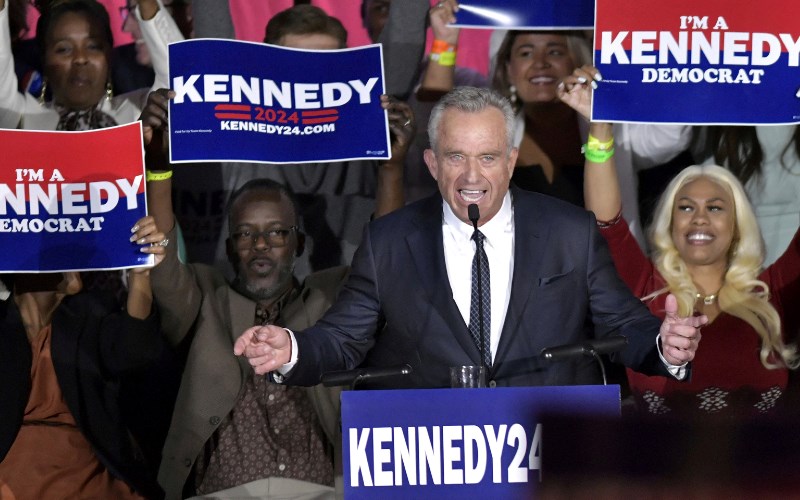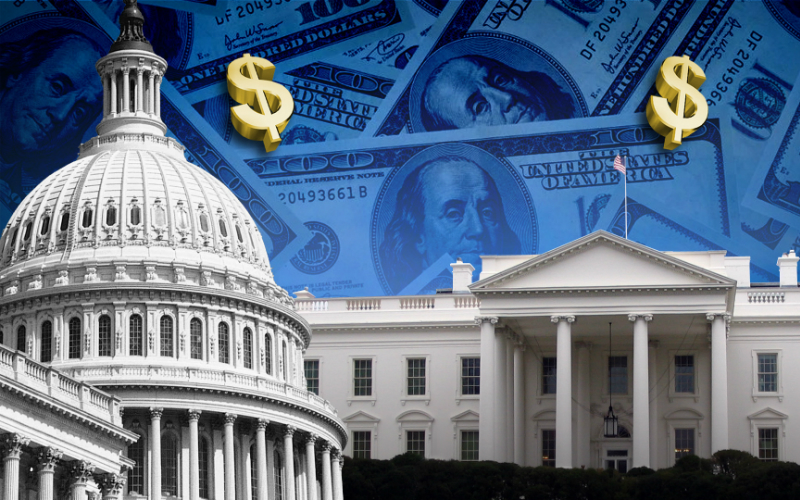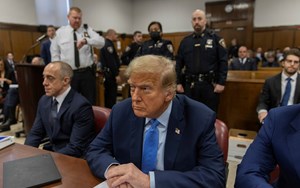Kennedy muddied his position on abortion while campaigning at the Iowa State Fair over the weekend. He told NBC News he’d sign a federal ban at three months – way out of step with most Democrats on the topic – but then softened his stance. Hours after the interview, a campaign spokesperson told the network, “Mr. Kennedy misunderstood a question posed to him by an NBC reporter in a crowded, noisy exhibit hall at the Iowa State Fair.”
The spokesperson said Kennedy believes a woman “always” has the right to choose and that he “does not support legislation banning abortion.”
The official Catholic stance is fiercely against abortion.
Biden’s Department of Justice spent the entire legislative session in a standoff with Republican senator Tommy Tuberville because of the DOJ’s extreme measures to circumvent last summer’s landmark Supreme Court ruling that returned abortion regulation to the states.
There has been no apparent inner struggle for Biden in opposing his church in other social matters such as gender confusion and same-sex marriage.
Biden’s DOJ has even caught caught infiltrating Catholic churches in search of violent extremists.
The idea of a future Kennedy administration affecting abortion, or any other policy matter important to Catholics, seems far-fetched as he currently polls at 14% to Biden’s 64%.
When the subject turns to the president’s frailty of mind and body, it’s California governor Gavin Newsom – not Kennedy – who is first mentioned as a likely replacement for Democrats.
But this much is clear on Kennedy the candidate: Faith matters to him.
It especially mattered in 1968 when his father Robert F. Kennedy, U.S. attorney general and then a senator and aspiring president, was assassinated.
Faith vs. drug addiction
The son mourned the father with drug use, the beginning of a 14-year addiction. Robert F. Kennedy Jr. says it was his faith that help beat addiction, a story many others can attest to.
He spoke about his struggles in a town hall meeting televised by NewsNation.
“It was really the whole ballgame, his faith, in terms of getting out of his drug addiction,” Harry Scherer, contributing editor for The American Conservative, said on American Family Radio Thursday.
Scherer recently compiled a lengthy piece on Kennedy entitled, “The Other Populist in the Race.”
“He went into the whole background about the 12-step program in which he still participates and is very transparent about the fact that he's still getting on the phone every day talking to people in that program,” Scherer told show host Jenna Ellis.
“He has a sort of vulnerability about his personal life, about his faith. He talked in great detail about the sort of Catholic devotional practices in which he was steeped throughout his childhood. He talked about getting up and offering his day to the Lord in a morning offering, praying the rosary, going to mass, praying before and after meals,” Scherer continued. “He’s going into great detail about that.”
Scherer’s sit-down with Kennedy for his story predated Kennedy’s time at the Iowa State Fair but even then Kennedy was somewhat vague on the topic. He recalled his growing up years and referenced “honest disagreements” on the topic.
He mentioned his aunt, Eunice Kennedy Shriver, the founder of Special Olympics, as a person of influence in his upbringing who was also pro-Life.
Kennedy’s abortion position may be unclear, but he cares deeply about important social topics, Scherer said.
“There was no indication that there was a topic he was not willing to talk about,” Scherer said. “When we got to physician-assisted suicide, there was a pause for 19 seconds. I counted it back later.”
Hard topics and an emotional man
Kennedy’s wife, Mary Richardson Kennedy, committed suicide in 2012.
The Westchester County Medical Examiner’s office reported death of asphyxiation by hanging. There were trouble signs along the way, according to ABC News.
Mary Richardson Kennedy and Robert F. Kennedy Jr., had been married for 16 years and had four children when they filed for divorce in 2010 a day after police had been called to the couple’s Bedford home in response to a “domestic incident.”
After his 19-second pause with Scherer, Kennedy responded saying, “I don’t even like to think about that issue.”
“He responds emotionally to some of these issues, especially the issues he cares most about," Scherer observed. "Then some of these other issues that are not sort of bedrock topics for his campaign he takes very seriously. He takes it personally.”
Scherer speculates that growing up in one of the world’s most famous political families, one marked by its own tragedies, makes Robert F. Kennedy Jr. that way.
“One of the more compelling things about him is that when he talks about these issues of diplomatic history, such as his uncle JFK, picking up the red phone to talk directly to the Kremlin, he's talking about it not merely as something that he read in the history book or heard about from friends, but it's something that he experienced in real time,” Scherer said.
If Kennedy is going to begin to make up serious ground in the race, it may be because people begin to listen to him and understand his passion.
“He can communicate and he leverages that in his messaging,” Scherer said.







